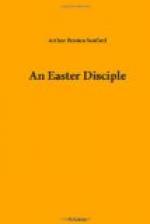What can Quintus do, in the face of such proof as this? He returns to Scopus in wildest tumult. Little does he say to Aulus, his chosen friend. The company of Longinus or the centurion he does not seek. The time has come—as it comes to all—when he must commune with himself, and make the decision confronting every soul that has heard the resurrection story.
IV
Cicero or Christ?
“The name of Jesus can still remove distractions from the minds of men.”—Origen.
Shall men believe in a future life because of Christ’s return from the grave? Is his established resurrection at Jerusalem the climacteric proof for immortality? The problem is inescapable. Every man is himself a judge; before every man the accumulated evidence passes; for every man it is doomsday when he stands at the point of decision.
In his sore perplexity Quintus says to himself that night, when he has returned from his interview with the disciple John: “My soul is like a traveler who halts at the point where two roads meet. Great issues depend upon his choice. But while he hesitates may the immortals, who watch over the destinies of men, guide his feet aright.”
Clearly defined are the alternatives before the Roman soldier. On the one hand are his ancestral beliefs, long established and deeply cherished by the nation. Nor does any man quickly toss aside the faith of his fathers. If belief is waning in the primitive mythologies, and if the social life of the Empire is moved by unrest and despair, the problem is to find a greater satisfaction. There have been spoken many beautiful words by the Roman scholars which are sweet premonitions of immortality. Does not Quintus remember that Cicero likens to heaven a port prepared, and prays that he may sail thither with full-spread sails? And if the gifted Cicero has just gone tragically out of life, let it be hoped that he has reached the harbor.
But on the other hand are the challenging and captivating words of Christ. Had he only spoken of the future life as an enthusiastic Teacher, and then had passed to the perpetual slumber of the grave like other philosophers of the time, he would be remembered long. But, when he had spoken his words concerning immortality, he had added, “I myself shall surely come back again.” From the evidence which Quintus has heard in Jerusalem he has now fulfilled his prediction. He has put to scorn the fidelity of the Roman sentinels at the tomb of Joseph; he has reversed the laws of nature; he has appeared again, in unique proof that there is to be a resurrection of the dead. Wide is the difference between Cicero and the Christ. The one has spoken a mere opinion, so beautiful in its phrase that it shall pass down into the future literature of men. The other has spoken a revelation, and then has returned to prove that revelation true. Which shall it be—Cicero or the Christ?




